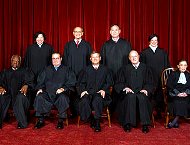11/29/2011
US Supreme Court Wrestles with GPS Surveillance of AutomobilesUS Supreme Court hears oral arguments in case over legality of warrantless GPS tracking of cars.

The US Supreme Court earlier this month heard oral arguments in a case that will set the legal boundaries for police GPS surveillance of automobiles. Last year, the US Court of Appeals for the DC Circuit ruled that police were wrong to spend a month tracking the every move of Antoine Jones, who was arrested on October 24, 2005 for drug possession (view opinion). A tracking device had been attached to Jones's Jeep without judicial approval. The high court judges engaged in heated debate about the rights of motorists in connection with the Fourth Amendment.
"It seems to me the heart of the problem that's presented by this case and will be presented by other cases involving new technology is that in the pre-computer, pre-Internet age much of the privacy -- I would say most of the privacy -- that people enjoyed was not the result of legal protections or constitutional protections; it was the result simply of the difficulty of traveling around and gathering up information," Justice Samuel Alito summarized. "But with computers, it's now so simple to amass an enormous amount of information about people that consists of things that could have been observed on the streets, information that was made available to the public."
The administration, represented by Deputy Solicitor General Michael R. Dreben, argued that police do not need to obtain a warrant because location information could have been obtained this information through ordinary surveillance methods. That means anyone could track even supreme court justices without violating their privacy.
"So your answer is yes, you could tomorrow decide that you put a GPS device on every one of our cars, follow us for a month; no problem under the Constitution?" Chief Justice John Roberts said. "Your argument is, it doesn't depend how much suspicion you have, it doesn't depend on how urgent it is. Your argument is you can do it, period. You don't have to give any reason. It doesn't have to be limited in any way."
Roberts suggested the process of obtaining a warrant serves as an effective limit. Scalia seemed to suggest that state legislatures were best suited to decide what limits should be placed on police tracking, not the courts. Other justices worried about the implications of allowing unrestricted tracking.
"[It's] an easy way, to pick someone up for speeding when you suspect something far worse but have no probable cause," Justice Ruth Bader Ginsburg said. "It's all in the computer. The police can say, we want to find out more about X, so consult the database, see if there is an indication that he was ever speeding in the last 28 days."
Justice Anthony M. Kennedy compared the GPS tracking to the use of speed cameras and red light cameras for tracking purposes.
"Lots of communities have, including Washington, cameras on -- at intersections on stop lights," Kennedy said. "Suppose the police suspected someone of criminal activity and they had a computer capacity to take pictures of all the intersections that he drove through at different times of day, and they checked his movements and his routes for five days. Would that be lawful?"
Justice Elena Kagan suggested constant police surveillance of an individual is obviously a violation of privacy.
"If you think about this, and you think about a little robotic device following you around 24 hours a day anyplace you go that's not your home, reporting in all your movements to the police, to investigative authorities, the notion that we don't have an expectation of privacy in that, the notion that we don't think that our privacy interests would be violated by this robotic device, I'm -- I'm not sure how one can say that," Kagan said.
The justices are expected to arrive at a decision by spring.


